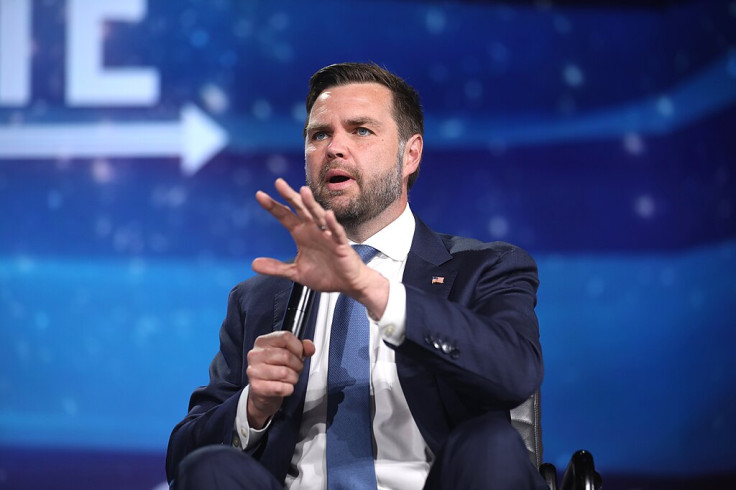JD Vance Blasts 'Disgusting' Claims He Disrespected Wife Over Faith Comments
Vice-President JD Vance defends onstage comments about his interfaith marriage, calling online criticism 'anti-Christian bigotry' after a Turning Point USA event at the University of Mississippi.

US Vice-President JD Vance has lashed out at critics who say he disrespected his wife after he told a conservative crowd he hoped she might one day embrace Christianity.
Two days after remarks at a Turning Point USA event in Oxford, Mississippi, Vance reiterated that his wife, Usha, 'is not a Christian and has no plans to convert' while defending his decision to answer a student question onstage about their interfaith marriage.
He called a critic's claim that he had 'thrown [his] wife's religion under the bus' 'disgusting' and accused opponents of 'anti-Christian bigotry' in a lengthy post on X. The exchange has ignited debate about religious tolerance, political posture, and the role of personal faith in public life.
What Was Said at The Turning Point Event
At a Turning Point USA forum on 29 October 2025, Vance was asked by a student about raising children in an interfaith household. He told the audience that he and Usha, who he said grew up in a Hindu family, now raise their children as Christians and that she often attends church with the family.
Vance said he 'honestly' hoped she might one day be 'moved by the same thing' that moved him, framing the remark as an expression of his faith rather than an attack on her heritage. The event was recorded, and the full remarks are available from the forum's posted video.
That clip quickly circulated online and prompted pointed responses. Conservative commentator Ezra Levant posted that it was 'weird to throw your wife's religion under the bus' for acceptance among the movement's hard-right flank; Vance replied on X that such criticisms were 'disgusting' and symptomatic of hostility toward Christians.
What a disgusting comment, and it's hardly been the only one along these lines.
— JD Vance (@JDVance) October 31, 2025
First off, the question was from a person seemingly to my left, about my interfaith marriage. I'm a public figure, and people are curious, and I wasn't going to avoid the question.
Second, my… https://t.co/JOzN7WAg3A
The vice-president pushed back even further in his social-media post, saying his Christian convictions make him want to share the Gospel and that discussing faith as a public figure was appropriate.
Political Context and The Backlash
The controversy landed amid heightened scrutiny of how politicians discuss religion and identity. Vance's comments were reported across major outlets and aired in segments that replayed the Turning Point footage, amplifying public reaction.
Critics argue the remark smacks of cultural insensitivity and pandering to Christian nationalist elements; supporters counter that expressing hope a loved one embraces one's faith is a private sentiment that voters are entitled to hear from public figures. Coverage from national broadcasters captured both the original exchange and Vance's subsequent defence.

Analysts told broadcasters the episode reveals a delicate calculation for modern conservative figures who fuse religious conviction with political messaging: speaking candidly about faith can humanise politicians to some constituencies while alienating others who view such remarks as exclusionary.
The episode also reopened questions about how public figures identify and describe their partners' religious identities. Several commentators noted discrepancies between Vance's description of Usha as 'not particularly religious' and reporting that places her background within Hindu family traditions.
Vance's Defence and The Wider Implications
In his post on X on 31 October 2025, Vance insisted his remarks were sincere and not intended to demean his wife. He emphasised that Usha encouraged his own spiritual journey and affirmed that he will 'continue to love and support her' regardless of her religious choices, while rejecting what he termed 'anti-Christian bigotry'.
The post, and the original onstage exchange, now figure in broader debates about religious pluralism, political signalling, and the personal costs for families of high-profile public life.
Legal and religious commentators told broadcasters that there is no legal consequence to expressing hope that a spouse will share one's faith, but they warned of political fallout: remarks that seem to diminish a partner's faith can provoke swift backlash in today's social-media environment and may be exploited by opponents on both cultural and electoral grounds.
For communities concerned about religious marginalisation, the incident has been a reminder of how quickly private family remarks can be reinterpreted as cultural or political statements.
Vance's case illustrates a modern political paradox: personal faith can be a source of authenticity for voters, yet candid expressions about converting loved ones can be framed as insensitive or exclusionary when amplified beyond the family circle.
© Copyright IBTimes 2025. All rights reserved.




















